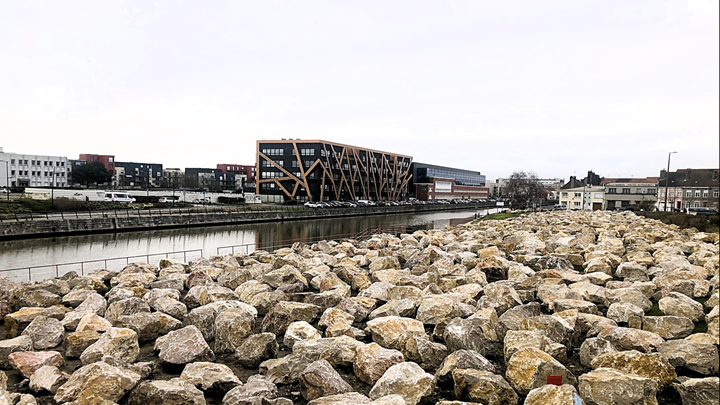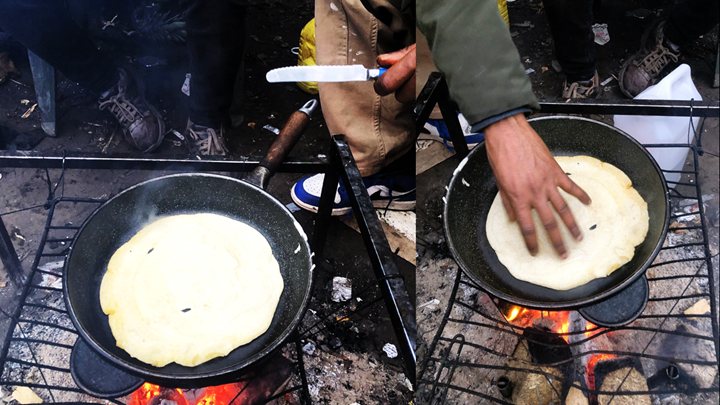Alex Holmes, a British photographer and writer, regularly volunteers in the refugee encampments in Calais. Here he provides his reflections following his latest, weeks-long stay at the Maria Skobtsova safe house, with time also spent visiting the BMX Eritrean camp.
 Calais - A new field of boulders fills the canal side site near the city centre; a further deterrent to refugee encampment. Two kilometres away, work is completed on a three metre high fence enclosing BMX, the old Eritrean camp cleared by the authorities in November. The single set of gates into the site is securely locked. Close to BMX, the last section of a new cycle route is opened by Natacha Bouchart, the mayor of Calais. She apologies for the delay in its completion, for the ‘painful memories’ and the ‘traumas’ caused by ‘migrants’ and congratulates local residents on ‘their courage’. ‘Security’ and ‘tranquillity’ she assures them have been restored.
Calais - A new field of boulders fills the canal side site near the city centre; a further deterrent to refugee encampment. Two kilometres away, work is completed on a three metre high fence enclosing BMX, the old Eritrean camp cleared by the authorities in November. The single set of gates into the site is securely locked. Close to BMX, the last section of a new cycle route is opened by Natacha Bouchart, the mayor of Calais. She apologies for the delay in its completion, for the ‘painful memories’ and the ‘traumas’ caused by ‘migrants’ and congratulates local residents on ‘their courage’. ‘Security’ and ‘tranquillity’ she assures them have been restored.
Mid-winter, the solstice just passed. Overhead a fresh crescent moon like a silver smile is flanked east and west by two celestial eyes, Venus and Saturn. The old stadium camp has been re-occupied. In the glare of the security lights, a collection of tents hug the high concrete wall. Four people are sitting around a smoking fire. One is a young Eritrean woman. She has a child they say. She lights the torch on her phone, opens a tent and pulls back layers of blankets. Two dark eyes sparkle in the soft darkness. She lifts the little bundle and returns to the fireside. Her baby, a little boy, is barely seven weeks old. His Eritrean name means ‘the gift of God’. Soon mother and son* are enveloped in acrid smoke from a burning trainer added to the fire. Normal she says. She mixes powdered milk with water from a plastic flagon and begins to feed her baby.
Despite the obliteration of BMX camp, food distribution continues in BMX parking. A mix of communities gather there. Eritreans and Ethiopians. Sudanese. A small group of Syrians newly arrived in Calais. We are famous for dancing says one of them. Music is playing and they dance. A crowd gathers around them and one by one the bystanders become participants. The year turns bringing bitter cold. There is snow on the ground. 6th January, the Epiphany, gifts given to the Christ Child. A small fire has been lit in the parking area to fend off the freeze as people wait for food but no food is delivered. The 7th is a repeat of the 6th. Eventually word gets through; people must go to a new location to get food. The new location is half an hour away.
 5.00 pm. The dark azure sky morphs to gold on the western skyline. Another cold night ahead. The moon and Venus glitter through the cross hatch of bare branches above the small woodland encampment. Blankets are tied to the trees to break the wind. Fireside, bambino Omran, braces on his teeth, ever cheerful despite being beaten and having his phone stolen, kisses first the map of Eritrea on a borrowed phone, then Scotland. I love Scotland he says. My brother is there. He turns his attention to the coffee he’s making, his brew always ginger-laced. It will be sweet and will burn the throat. Nights are good says Amar. Fire, music, food, no police, no stress. Mihrban stirs his taita* mixture. First time I make taita in Calais he says. New faces around the fire. Shy Fessehaye has been travelling for ten years. Wafiq, his first day in Calais, shares photos. He is with friends in Eritrea, by the sea, a break from army conscription. In 2022 he was sent to fight in the war against Tigray in Ethiopia. He threw his gun away and left. We are all habesha, all one culture he says. I could not kill my brothers. To him the Calais cold is nothing. You want real cold? Go to Belarus, it was negative 15. A broad contented smile widens across his firelit face.
5.00 pm. The dark azure sky morphs to gold on the western skyline. Another cold night ahead. The moon and Venus glitter through the cross hatch of bare branches above the small woodland encampment. Blankets are tied to the trees to break the wind. Fireside, bambino Omran, braces on his teeth, ever cheerful despite being beaten and having his phone stolen, kisses first the map of Eritrea on a borrowed phone, then Scotland. I love Scotland he says. My brother is there. He turns his attention to the coffee he’s making, his brew always ginger-laced. It will be sweet and will burn the throat. Nights are good says Amar. Fire, music, food, no police, no stress. Mihrban stirs his taita* mixture. First time I make taita in Calais he says. New faces around the fire. Shy Fessehaye has been travelling for ten years. Wafiq, his first day in Calais, shares photos. He is with friends in Eritrea, by the sea, a break from army conscription. In 2022 he was sent to fight in the war against Tigray in Ethiopia. He threw his gun away and left. We are all habesha, all one culture he says. I could not kill my brothers. To him the Calais cold is nothing. You want real cold? Go to Belarus, it was negative 15. A broad contented smile widens across his firelit face.
* They were given safe accommodation at Maria Skobtsova House https://www.refugeehousecalais.org/
*Taita, or injera, traditional Eritrean/Ethiopian flat bread.